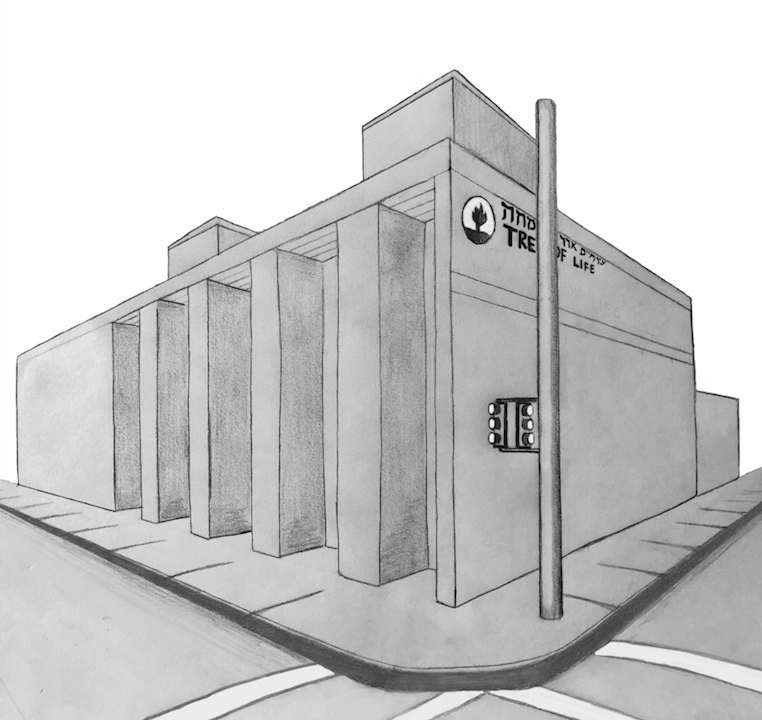Contemplating Jewish identity at Urban in light of the Pittsburgh shooting
Illustration of Tree of Life synagogue, by Loki Olin, Features Editor
This article is expanding on another online article about the Pittsburgh shooting. While this article focuses more on the effects that the shooting had on Urban students, the article online expands more on the roots of anti-Semitism and how experts outside of Urban view the shooting. For additional context, take a look at the online article entitled, “The deadliest act of anti-Semitism in American history”
For some Urban students, Judaism is a core aspect of their identity. “Jewish values have informed a lot of my decisions”. Said Ella Rosenblatt ‘19, co-leader of Jew Crew, “I’m vegan and I think that my veganism is a manifestation of Tikkun Olam [taking care of the world]. I think that my work with Holocaust survivors is a manifestation of L’dor V’dor [from generation to generation]. I think that my work in Peer Resource mirrors the Jewish value that says, ‘To save one life is to save the entire world.’ I think that Judaism transcends the typical barriers of religion and is unique.”
In light of the recent shooting in Pittsburgh and with the rise of anti-Semitism since the election of President Trump (according to the Washington Post), what it means to be Jewish in America is changing and so is what it means to be Jewish at Urban.
Maya Sheinfield-Kandel ‘19, one of the co-leaders of Jew Crew, said, “I’m a proud Jew. I don’t want to hide that fact of who I am. But I feel like it’s really scary to be Jewish, seeing what’s going on in the world right now. Even in the U.S.” Sheinfield-Kandel is not the only one who shares this sentiment.
Rosenblatt added, “I feel like I’m more conscious of anti-Semitism than I ever have been. I acknowledge that I’m super-privileged but I feel more and more like a minority.”
In an interview with the Urban Legend, David Wilensky, Online Editor of J.The Jewish News of Northern California, discussed the privilege that white Jews have in America. “Most Jews appear white, so there’s a great deal of privilege in our community. During the ‘50s and ‘60s, white Jews became white people in America. But anti-Semitism didn’t go away,” Wilensky said.
While white Jews have benefitted on many levels from white privilege, anti-Semitism has not disappeared. The Pittsburgh shooting had a strong emotional impact on many members of the Jewish community. In an interview with the Urban Legend, Ava Becker ‘21 said, “I was actually sitting in the St. Agnes gym for an open house that I was working for SAC and then I saw the news pop up on my phone…I started crying.”
After tragic events like these, Sydney Cohen ‘19 reflected on gratitude she felt for being at Urban: “I feel like there are spaces for everyone’s identity at Urban. I think that’s a really important aspect of Urban. I feel you can feel safe with any aspect of your identity.”
Leo Fine ‘19 felt that neither the Pittsburgh shooting nor Jewish issues have been given enough attention. “I did feel a stronger emotional connection to the way that I feel like the issue was treated by our very liberal school with a huge emphasis on social justice. And that even though we do tend to focus on that sense of justice and equality and tolerance, I felt that the shooting was not talked about in any significant way by communities that were not Jewish. And it reaffirmed my sense that Jewish issues kind of get swept under the rug in Urban’s curriculum, especially regarding service learning and American history.”
Additionally, Fine shared some insight into what he thinks are the next steps to take after the Pittsburgh Shooting including discussing HIAS (Hebrew Immigrant Aid Society). HIAS is a Jewish organization that has been helping immigrants and refugees rebuild their lives for over 100 years. According to the New Yorker, on the Shabbat of the shooting, the synagogue was observing a HIAS project called Refugee Shabbat. The shooter especially targeted the synagogue on that day not only because of his anti-Semitic beliefs but he also because he harbored a hatred for refugees as well. Fine said: “It was both an attack on Jews in that synagogue and also on immigrants and their status in America. I think that it’s really important to support HIAS and continue to fight in whatever form we choose for immigrant rights in America.”
One of the responses from the Urban community occurred just days after the shooting when Latinx put up pictures of the victims of the Pittsburgh shooting on the altar for Dia de Los Muertos, (Day of the Dead) a Holiday honoring loved ones who have passed. Mookie Corpuz ‘19, one of the co-leaders of Latinx commented about the decision to put up the pictures of the victims. Corpuz said, “The Dia de Los Muertos altar set up by Latinx Affinity Space allowed the Urban community to celebrate their loved ones that have passed away. Thus, we wanted to provide a space for the celebration and remembrance of the lives that were lost in the Pittsburgh shooting.” Latinx’s actions show the power of walking with and showing up for people who are in crisis.
Going forward, Rosenblatt commented about what her Rabbi suggested were some possible next steps for Jews grieving for the victims of the Pittsburgh shooting. Rosenblatt discussed some of her rabbi’s (Rabbi Noa Kushner) reflections that she shared during Shabbat services the week after the shooting: “it’s important that you’re not just Jewish when an atrocity occurs or when something bad happens but that you’re Jewish all the time. And that’s something that’s inspired me to not just care about my Judaism when instances of anti-Semitism occur, but to care about my Judaism all of the time.”












